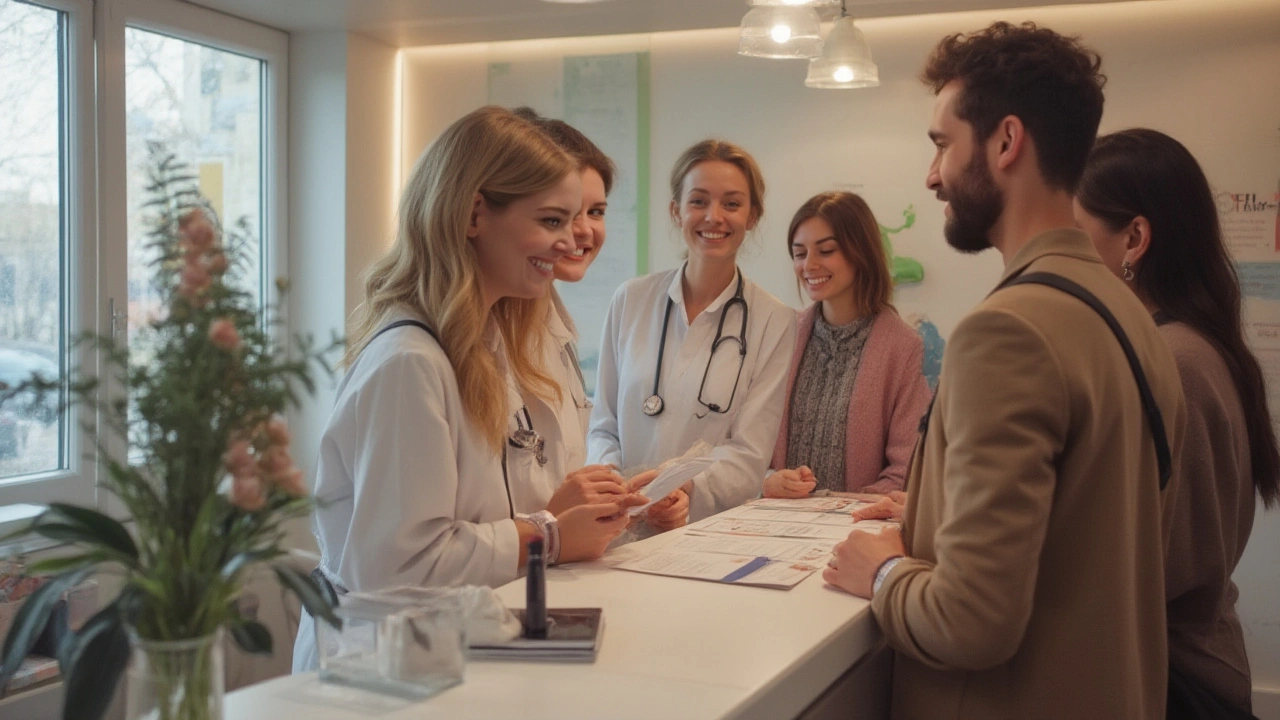Hidden behind the city's seductive sparkle, Paris is a place where new connections spark over café tables and romantic walks along the Seine. It’s more than just “the city of love”—it’s a place that invites freedom, fun, and, yes, a rich sex life. Plenty of people talk about Paris attractions, but not many stop to consider the risks and responsibilities before diving into these intimate adventures. Getting a regular sexual health check-up in Paris isn’t just about protecting yourself; it’s about keeping those you care about safe too.
The French Perspective on Sexual Health: Culture, Care, and Realities
One thing that stands out about sexual health in France, especially when you compare it to places like Sydney or London, is the openness people have about talking (or not talking) about sex. Sure, Paris is known for its liberal attitudes, but when it comes to getting tested or speaking up about sexual wellness, there’s still a lot of hesitation. The French healthcare system is solid—universal coverage, government support, and plenty of public sexual health clinics, called "Centres de Dépistage". Walk into a CeGIDD (Centre Gratuit d’Information, de Dépistage et de Diagnostic) and you’ll find discreet, often free testing for HIV, syphilis, chlamydia, and more. But many locals and expats skip these visits, thinking they only need a check-up if they notice symptoms or have a new partner. That’s a myth—and one worth breaking, especially in a place where casual encounters happen as easily as grabbing an espresso.
France’s Ministry of Health urges people—yes, even those in long-term relationships—to get check-ups once a year. But in Paris, where the pace is fast and apps like Tinder and Happn (a local favorite) are just as common as croissants, doctors recommend more frequent checks, maybe every three to six months for the sexually active. And there’s real reason to do so. A 2024 report from Santé Publique France showed a 12% increase in newly diagnosed STIs in the Île-de-France region. The same data revealed that nearly a quarter of Parisians aged 18-35 had never been tested—even though a third admitted to feeling anxious about their sexual health.
So what's holding people back? Sometimes it’s embarrassment (a very French desire for privacy), sometimes it’s fear, and sometimes it’s just not knowing where to go. Fortunately, you’re spoilt for options in Paris—public hospitals like Hôtel-Dieu, the Institut Fournier, and even specialized walk-in clinics in places like Le Marais or near Gare Saint-Lazare make it easy to get tested without judgment. Break the habit of waiting and see it as part of normal life in the city. After all, knowing your status is just another thing Parisians do with confidence.
Regular Check-Ups: Preventing Problems, Protecting Yourself and Your Partners
You might think, “I feel fine, so what’s the rush?” That’s one of the biggest traps in sexual health. Many STIs like chlamydia or gonorrhea can show zero symptoms for months, quietly causing damage and increasing the risk to future partners. This isn’t about being paranoid; it’s about being prepared. Paris nightlife is legendary—bars in Pigalle, clubs in Bastille, or the legendary LGBT+ scene in Le Marais—these places encourage connection, but often, no one stops the music to talk about health checks.
If you’re dating or hooking up regularly, make it part of your routine. Schedule it like you would your haircut at Camille Albane or your morning run through Parc des Buttes-Chaumont. You can even tie it to local events—printemps (springtime) check-up? Summer festival and an STI test to match? You’re not just protecting yourself. In France, where non-monogamy has a long tradition and discussions about open relationships aren’t rare, regular testing is an act of respect for your partners. Navigating the Paris dating scene without knowing your sexual health status is like driving down Boulevard Saint-Germain with your eyes closed.
Here’s a handy reality check with recent numbers:
| STI | Annual Cases (Paris 2024) | Most Affected Age Group |
|---|---|---|
| Chlamydia | 9,200 | 18-29 |
| Gonorrhea | 4,400 | 20-34 |
| Syphilis | 2,000 | 25-40 |
| HIV (new diagnoses) | 610 | 20-45 |
A lot of these cases are diagnosed during routine checks, when people didn’t suspect a thing. Getting tested regularly can stop silent infections in their tracks before they do real harm. And if you’re worried about privacy, clinics in Paris are worlds away from old stereotypes; there’s no shame, just helpful staff and quick results, often within a day or two. The CeGIDD service is available with or without an appointment, and many let you just walk in before lunch.

Where and How to Get Checked in Paris—Guides and Local Tips
Paris is bursting with choices for sexual health testing. If you want somewhere central, try Hospital Hôtel-Dieu on Île de la Cité—it’s got a discreet entrance and staff used to treating everyone from nervous teens to seasoned locals. The Institut Fournier is another Paris institution, a short walk from Montparnasse, renowned for sexual health care for over a century. For LGBT+ friendly clinics, Coalizione Plus and AIDES both have drop-in spots dotted around the city, often serving coffee with a side of gentle advice.
A great thing about France: most basic sexual health testing is covered by Assurance Maladie (national health insurance), which means you could pay zero out-of-pocket, especially if you’ve got a Carte Vitale. International students and expats, don’t stress—most CeGIDD centres welcome you, with services available in English and sometimes in Spanish, Arabic, or Mandarin. Some clinics, like those near Place de la République, even run pop-up stands during Pride Month, the “Printemps des Assoces” festival, or music events along the Canal Saint-Martin. You can find home test kits at pharmacies from trusted French brands like AAZ, though pro labs are usually more thorough.
Don’t forget routine screenings are not just for STIs. Paris gynecologists recommend getting cervical cancer screenings (Pap smears) every three years from age 25, and hepatitis B and C screening at least once in a lifetime. Men, you’re not off the hook—urologists in Paris’s West End often see guys waiting until symptoms show. Don’t fall into that trap; most clinics accept walk-ins for prostate or testicular checks. If you’re nervous, ask a partner or friend to join. Nothing says "friendship" like moral support in the waiting room at 10 a.m. on a rainy Tuesday.
- Book online through Doctolib—France’s favorite medical appointment platform—with filters for language, type of exam, and neighborhood.
- For same-day results, places like Laboratoire CBM 75 in Saint-Germain are known for speed (and friendly faces, even before coffee).
- Worried about anonymity? Pick a CeGIDD—no need to show ID or even give your real name if you don’t want to.
- If waiting inside a clinic isn’t your thing, look out for mobile testing vans at public events or in student neighborhoods like the Latin Quarter.
After the Check-Up: Next Steps and Keeping Your Sex Life Safe
So you’ve taken the plunge—got the check-up, maybe even brought along a mate for courage. What now? If your results are all clear, don’t tuck them away and forget. Many Paris doctors suggest setting a reminder on your phone—a simple “Time for next test!” three to six months down the track. Keeping digital copies of your test results can be helpful if you're dating and want to share peace of mind with new partners, especially for anyone who frequents clubs in Oberkampf or goes to speed-dating nights along Rue de Rivoli.
If you get a positive result, you’re not alone. Clinics in Paris offer comprehensive support, from counseling to free meds—and France leads Europe in providing affordable or free HIV-preventive medication (PrEP) for those at risk. Don’t hide or panic. Several local organizations, such as Sidaction and Le Kiosque, run hotlines and in-person sessions for anyone feeling lost or anxious. The French tradition may lean toward privacy, but no one expects you to go through this alone.
A crucial tip: talk openly with partners. While French romance has a reputation for mystery and allure, being upfront about testing is far sexier than secrecy. Sometimes, those convos are easier after a few glasses of Beaujolais, but don’t wait for the perfect moment. Practice makes perfect—and it turns out, people in Paris have a lot more respect for honesty than awkward silences. If you’re from out of town, say an expat or just visiting, don’t let travel interrupt your health. The same services are open to anyone, not just residents, so take advantage—even if you’re only in Paris for the fashion sales or the Paris Jazz Festival.
Finally, keep exploring ways to protect your sexual health beyond just check-ups. Paris pharmacies are stocked with every type of condom (Vegedream, Manix, and Durex are popular here). You’ll even find fun options like strawberry or kulfi flavor next to the registers. Check pharmacies near tourist areas for personal lubricant and rapid tests if you want immediate reassurance. And yes, the myth about French pharmacies is true—a quick chat with the pharmacist is often faster and more discreet than searching online.
Taking charge of your sexual health Paris style isn’t just about doctor’s orders. It’s about living that iconic Parisian confidence. Whether you’re living here or just passing through, check-ups are your backstage pass—not just to romance, but to peace of mind, freedom, and the kind of pleasure that really lets you enjoy the city of lights without a worry.

